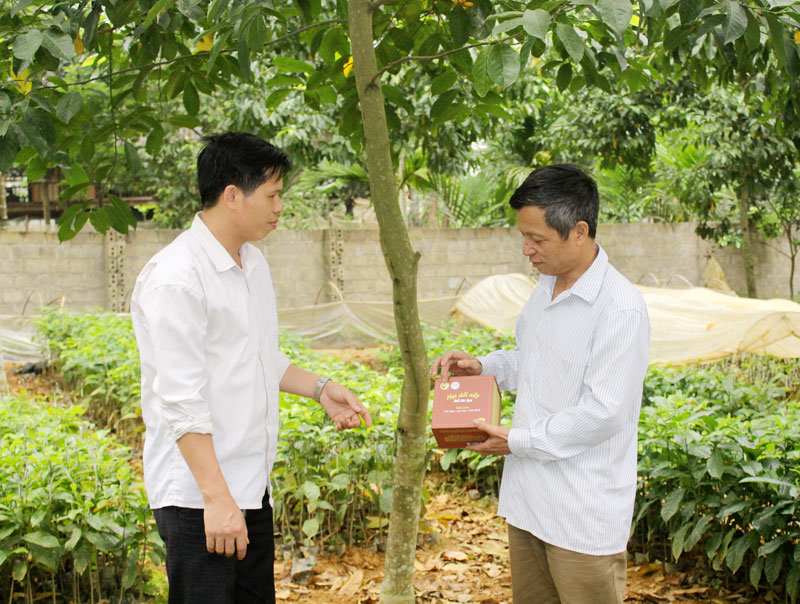
(HBO) – Chi Dao "doi” seed, a staple of Chi Dao commune (Lac Son district), has been given a three-star rating in Hoa Binh province’s One Commune One Product (OCOP) programme. The recognition offers opportunities for the product to reach further, raking in sustainable economic growth for local residents in Muong Be.
 Chi
Dao "doi” seed (Lac Son district) has received a three-star recognition of the
province’s OCOP programme. Its package contains label, barcode and traceability
code.
Chi
Dao "doi” seed (Lac Son district) has received a three-star recognition of the
province’s OCOP programme. Its package contains label, barcode and traceability
code.
Muong Be is a long-time name of the land
famous for "doi” seed – Chi Dao commune. Over the past 10 years, decade- and
centenary-old "doi” trees situated next to wooden stilt houses have brought
prosperity to people in the remote area.
Since the plant has gained public
attention, local authorities and residents have been doing their best to
promote the product and its brand, as well as help it reach markets nationwide.
The establishment of a cooperative on "doi” seedling supply and agricultural
services in Chi Dao commune was part of the efforts.
Progress has been made since the birth of
the cooperative. It is able to retain quality of the local seed among those
produced in other places. At the same time, members are advised not to opt for
profit at the expense of quality by choosing a prompt but inaccurate processing
method, such as boiling the seed for quicker drying process.
Notably, seedlings of Chi Dao commune have
been known to customers across the country. Chi Dao "doi” trees are being
cultivated in forests of many Central Highland provinces.
The recent recognition is expected to
facilitate the development and value of Chi Dao "doi” tree. To seize the
opportunities, locals need to take the initiative in production and improve
quality product in the competition against other brands in a bid to protect
their own staple.
"Doi” growers in the commune also hope to
receive due attention and support from relevant agencies in terms of training,
application of science-technology, and trade promotions./.
In Hoa Binh province, 11 traditional craft villages with more than 400 small-scaled production households have put in place a clean and green production model, establishing new standards for sustainable development. Waste collection sites and wastewater treatment facilities have been meticulously managed by local residents.
To make it easier for the residents to handle administrative procedures, Yen Bong Commune (Lac Thuy District) has identified the administrative reform as one of its key tasks. By implementing a range of synchronized solutions, the commune has seen the positive changes in the administrative reform, meeting the needs of its people.
Mai Chau district has firmly established itself as a standout destination on Vietnam’s tourism map, attracting both domestic and international visitors with its breathtaking landscapes, rich ethnic culture, and warm hospitality. However, beyond its natural and cultural charm, a secure and well-managed tourism environment has added to Mai Chau’s appeal.
As Vietnam enters a new phase of economic and administrative reform in 2025, Hoa Binh province is stepping up its efforts to streamline governance, boost economic growth, and attract investment.
The Hoa Binh provincial People's Committee held its monthly meeting on March 26 to review the progress of key projects, assess budget revenue and public investment disbursement, provide feedback on draft documents for submission to the provincial Party Committee's Standing Board, and discuss other important matters related to the committee's governance activities.
Playing a key role in Hoa Binh province’s economic development, Luong Son district has been focusing on science and technology development, innovation, and digital transformation.



 Chi
Dao "doi” seed (Lac Son district) has received a three-star recognition of the
province’s OCOP programme. Its package contains label, barcode and traceability
code.
Chi
Dao "doi” seed (Lac Son district) has received a three-star recognition of the
province’s OCOP programme. Its package contains label, barcode and traceability
code.